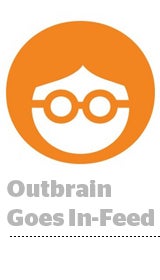 Outbrain will allow publishers to sell native in-feed placements via their direct sales channels.
Outbrain will allow publishers to sell native in-feed placements via their direct sales channels.
In beta testing with four publishers, publishers can offer the units on a CPC or CPM basis.
“Over the last six months, we’ve had more and more publishers dipping their toe into native ads,” said Matt Crenshaw, Outbrain’s VP of product marketing.
Outbrain decided to extend its product because it already worked closely with publishers as a provider of content referral links that run on the right rail or at the bottom of the page.
Outbrain competitor Taboola appears to be looking in the same direction. On Thursday, Taboola got a $3 million investment from the Daily Mail to develop ad products to drive traffic to sponsored posts.
If a publisher has an unsold ad slot, Outbrain can insert one from its existing network. Eventually, it may create a separate network for native in-feed units.
Because Outbrain believes it already has scale and can offer 100% fill rates, it’s not interested in plugging into open exchanges through a recently developed OpenRTB 2.3 standard, Crenshaw said. It also wants to ensure high ad quality for publishers.
“Publishers get nervous about exchanges,” Crenshaw said. “They need almost editorial control over content, because it’s the home page. We have a direct relationship with the publisher and advertisers. We’re essentially cutting out the middlemen, and publishers like that.”
Depending on whether the in-feed placement comes from the publisher or Outbrain, it will bear different labeling: either “recommended by Outbrain” if Outbrain is serving the ad, or “sponsored by brand X” if it’s a publisher-sold placement.
Proper ad disclosures for native advertising is something the FTC has had its eye on as the online format rises in popularity. During the Clean Ads conference last week, FTC associate director of advertising Mary Engle warned publishers to pay attention to the presentation of native content they create.
Outbrain – chastised by the Advertising Standards Authority in the UK but never in the US for its disclosures –says it’s often an educator when it comes to proper ad disclosures.
“We used to have just the Outbrain logo, and that’s not transparent enough,” Crenshaw said. “Users have to know where the content is coming from, or it becomes a mess. We don’t want to be in the business of trading user trust for click-through rates.”











